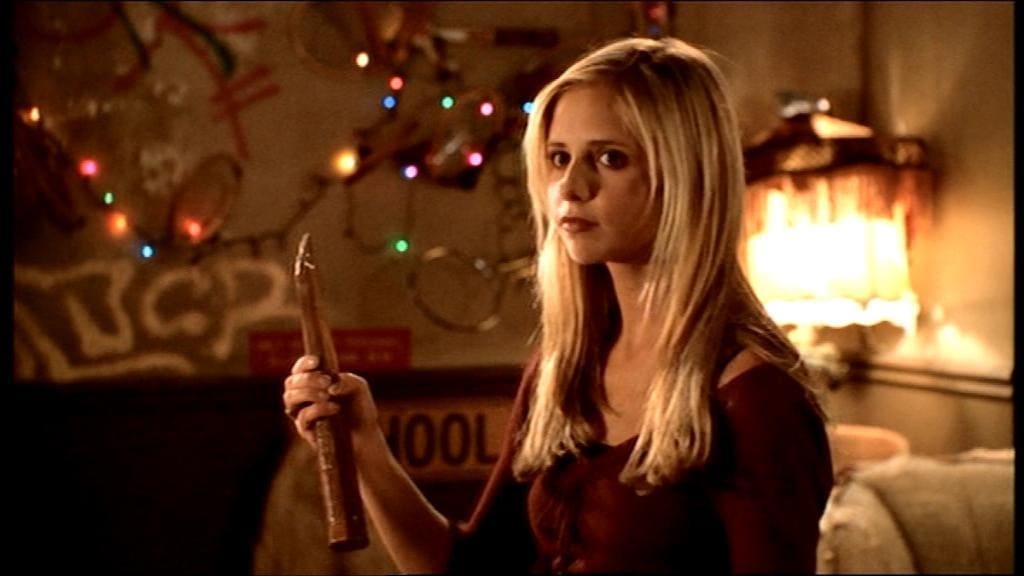
**Warning: May contain show spoilers.
Over the last few months, I’ve slowly been re-watching one of my favourite science-fiction television shows — Buffy the Vampire Slayer (BTVS). Little did I know that just as I opened the first episode of season five (thanks Netflix), I would be surprised by the following announcement.
It is the show’s 20th anniversary.
The 1997 television drama merges high-school comedy and supernatural horror into one successful package. The storyline follows Buffy Summers, “one girl in all the world, a chosen one”, who has the strength to kill vampires and demons and save the world from multiple apocalypses — the plural of apocalypse has never been confirmed, even in the show. “I suddenly find myself needing to know the plural of apocalypse.”
Also, did I mention she is 16 and simply trying to get through high school in one piece without revealing her secret identity?
I realize this description may sound cheesy — and ultimately, the first few seasons of the show were just that. But, it was also good television. Joss Whedon, the show’s creator, knew how to merge all these great themes together in a way that made you laugh, cry, and yell at the TV with each plot betrayal. Many of the monsters Buffy fights are metaphors themselves for real-life high school issues. Inappropriate teacher-student relations, peer pressure, online dating, physical abuse, and, of course, teenage romance. All the while kicking serious vampire ass in high heels and a halter-top. Now, that’s female empowerment!
As Buffy grows older, the show introduced a lot adult themes like casual sex, employment, and the effects of alcohol. The characters viewers spent years getting to know started to change and grow. They went off to university, dealt with career transitions, and experienced intense loss. Buffy’s best friend Willow starts to build a relationship with fellow witch Tara in what was my first introduction into lesbianism as a teen. This exploration of sexuality was done in such a subtle and honest way that it just seemed a natural transition for the character, and for the viewers.
What does this all have to do with feminism, you may ask? The whole idea of BTVS was that a young girl, someone who is often overestimated in intelligence and strength, has the ability to conquer the worst evils the world has ever seen. She has boyfriends, sure, but usually she is the one doing the rescuing. As she tells her sister Dawn, “no guy is worth your life, not ever.”
In the end, Buffy becomes the idealistic female superhero. Sure, she has a few male sidekicks and a British father figure to offer guidance, but at the end of the day, it’s Buffy’s plan, her leadership, and her sacrifice that saves the world.
And then, there is the last season (note: serious spoilers ahead).
As Willow and Buffy work together to break the “one chosen one in all the world” curse, her strength and power is transported into all the potential slayers around the world. From the young teenagers fighting the ultimate evil to the six-year-old playing baseball in the park, that energy flows within them, making them stronger and more capable then ever before. Now, it’s up to all of womankind to fight the battle. Could there be a more perfect symbol for female strength and unity?
At the end of the series, she doesn’t get the guy. In fact, she is independent, standing among the rubble of the apocalypse she helped prevent, with her friends and family by her side. She is strong, stoic, and just plain awesome.
If I wrote an article about all the things I learned, and continue to learn, from this amazing 90s television show, it would result in an essay over 10,000 words in length. Every few years, I re-watch BTVS and find something I previously missed. I usually watch it when I need to rejuvenate my sense of purpose or when I’m feeling down after the end of a relationship. Buffy the Vampire Slayer isn’t just a quirky teenage drama with lovable characters and a few evil vampires to fill in the space. It is a coming of age tale that represented all of the good and bad elements involved in growing up. Underneath the supernatural magic of this television show, BTVS is able to accurately portray the effects of death and trauma on a group of young kids, while still instilling hope in those who were watching it.
Not many television shows nowadays can make that same claim.
All of this is to say, happy 20th anniversary BTVS! I have no doubt that, in another 20 years, people will still be talking about this iconic and empowering series.
Are you a fan of Buffy the Vampire Slayer? Let us know what the show means to you below!



